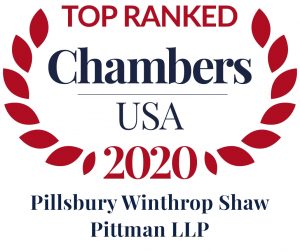 Pillsbury SALT is proud to announce its inclusion in the Chambers USA 2020 Guide. In 2020, Chambers ranked 28 Pillsbury practices and 79 individual lawyers. Tireless work & deep client relationships again awarded Pillsbury SALT’s Carley Roberts and Jeff Vesely individual recognition. Continue Reading ›
Pillsbury SALT is proud to announce its inclusion in the Chambers USA 2020 Guide. In 2020, Chambers ranked 28 Pillsbury practices and 79 individual lawyers. Tireless work & deep client relationships again awarded Pillsbury SALT’s Carley Roberts and Jeff Vesely individual recognition. Continue Reading ›
COVID-19: Comprehensive Coverage of State Income Tax Relief as of April 13, 2020
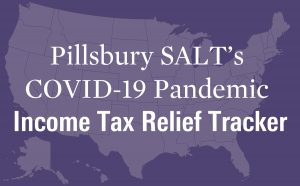 State income tax relief in the form of tax return filing and tax payment extensions, and the deployment of related administrative guidance, has evolved rapidly in the last several weeks in the face of the COVID-19 crisis. Of the 45 jurisdictions, including the District of Columbia, that impose an income tax on corporations, 40 have established income tax relief to corporate taxpayers in the form of tax payment extensions, return filing extensions and/or various penalty and interest relief during the extension period. Arkansas, Minnesota and Montana are playing hardball, affirmatively announcing no income tax relief will be provided to corporate taxpayers. Massachusetts has announced it purportedly does not have the authority to extend income tax filing or payment deadlines to corporations but has provided late-filing and late-payment penalty relief. And unique as always, Florida still appears to be on the fence.
State income tax relief in the form of tax return filing and tax payment extensions, and the deployment of related administrative guidance, has evolved rapidly in the last several weeks in the face of the COVID-19 crisis. Of the 45 jurisdictions, including the District of Columbia, that impose an income tax on corporations, 40 have established income tax relief to corporate taxpayers in the form of tax payment extensions, return filing extensions and/or various penalty and interest relief during the extension period. Arkansas, Minnesota and Montana are playing hardball, affirmatively announcing no income tax relief will be provided to corporate taxpayers. Massachusetts has announced it purportedly does not have the authority to extend income tax filing or payment deadlines to corporations but has provided late-filing and late-payment penalty relief. And unique as always, Florida still appears to be on the fence.
Continue Reading ›
New York FY 2021 Budget Bill Decouples from CARES Act Taxpayer Relief Provisions
 On April 3, 2020, New York State enacted the 2021 fiscal year budget (Budget). The Budget contains several tax measures including decoupling from taxpayer relief provisions of the Coronavirus Aid, Relief, and Economic Security Act (CARES Act). The CARES Act was signed into law on March 27, 2020 with the primary objective to provide economic relief and greater liquidity to American taxpayers facing hardship because of the COVID-19 crisis. Specifically, the Budget decouples from taxpayer favorable provisions in the CARES Act including the increase to the permitted business interest expense deduction and the beneficial NOL provisions. As a result, New York taxpayers will not receive the benefit of the CARES Act relief provisions for New York tax purposes. Continue Reading ›
On April 3, 2020, New York State enacted the 2021 fiscal year budget (Budget). The Budget contains several tax measures including decoupling from taxpayer relief provisions of the Coronavirus Aid, Relief, and Economic Security Act (CARES Act). The CARES Act was signed into law on March 27, 2020 with the primary objective to provide economic relief and greater liquidity to American taxpayers facing hardship because of the COVID-19 crisis. Specifically, the Budget decouples from taxpayer favorable provisions in the CARES Act including the increase to the permitted business interest expense deduction and the beneficial NOL provisions. As a result, New York taxpayers will not receive the benefit of the CARES Act relief provisions for New York tax purposes. Continue Reading ›
Missouri Supreme Court Ends Longstanding Practice of Applying Use Tax Definitions in Sales Tax Cases
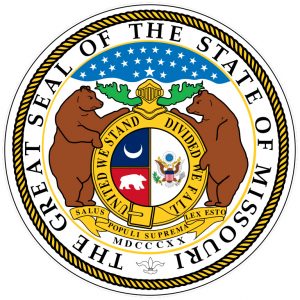 On March 17, 2020, the Missouri Supreme Court held that the use tax definition of “sale” cannot be applied to sales tax cases, turning more than two decades of precedent on its head. In DI Supply I, LLC v. Director of Revenue, DI Supply sold hotel room furnishings to its parent, Drury Hotels Company (DHC), which operates hotels. The issue before the court was whether DI Supply’s sales to DHC were nontaxable sales for resale. DI Supply argued the sales were for resale because DHC transferred the right to use the hotel room furnishings to its guests and included the cost of such items in the nightly room rate. Continue Reading ›
On March 17, 2020, the Missouri Supreme Court held that the use tax definition of “sale” cannot be applied to sales tax cases, turning more than two decades of precedent on its head. In DI Supply I, LLC v. Director of Revenue, DI Supply sold hotel room furnishings to its parent, Drury Hotels Company (DHC), which operates hotels. The issue before the court was whether DI Supply’s sales to DHC were nontaxable sales for resale. DI Supply argued the sales were for resale because DHC transferred the right to use the hotel room furnishings to its guests and included the cost of such items in the nightly room rate. Continue Reading ›
Oregon Tax Court Applies Wayfair Retroactively in Telecommunications Tax Case
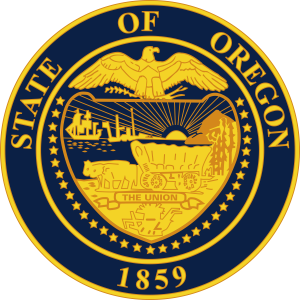 The Regular Division of the Oregon Tax Court just handed down a nexus decision with respect to the collection of an emergency telecommunications tax (E911 Tax). In Ooma, Inc. v. Department of Revenue, TC 5331 Tax Court, 03/02/2020, the Court concluded that notwithstanding the absence of physical presence in Oregon, a company which provided VOIP services to Oregon customers, was required to collect the E911 Tax. Continue Reading ›
The Regular Division of the Oregon Tax Court just handed down a nexus decision with respect to the collection of an emergency telecommunications tax (E911 Tax). In Ooma, Inc. v. Department of Revenue, TC 5331 Tax Court, 03/02/2020, the Court concluded that notwithstanding the absence of physical presence in Oregon, a company which provided VOIP services to Oregon customers, was required to collect the E911 Tax. Continue Reading ›
COVID-19: Comprehensive Coverage of State Income Tax Relief as of March 29, 2020
 Forty-four states plus the District of Columbia impose an income tax on corporations. In response to the COVID-19 pandemic, 36 of those 45 jurisdictions have established income tax relief to corporate taxpayers in the form of tax payment extensions. Of those 36, most also extended the return filing deadline and have waived all penalties and interest during the extension period. Four states are playing hardball, affirmatively announcing no income tax relief will be provided to corporate taxpayers: Arkansas, Minnesota, Montana and New Hampshire. Three states seem to be keeping their heads in the sand, having made no announcement at all regarding tax relief to corporate taxpayers: Alaska, Massachusetts, and Pennsylvania. And two states appear to be on the fence: Florida and New Jersey.
Forty-four states plus the District of Columbia impose an income tax on corporations. In response to the COVID-19 pandemic, 36 of those 45 jurisdictions have established income tax relief to corporate taxpayers in the form of tax payment extensions. Of those 36, most also extended the return filing deadline and have waived all penalties and interest during the extension period. Four states are playing hardball, affirmatively announcing no income tax relief will be provided to corporate taxpayers: Arkansas, Minnesota, Montana and New Hampshire. Three states seem to be keeping their heads in the sand, having made no announcement at all regarding tax relief to corporate taxpayers: Alaska, Massachusetts, and Pennsylvania. And two states appear to be on the fence: Florida and New Jersey.
See our latest matrix for comprehensive coverage (updated April 14), on state income tax relief to corporations, other business entities, and individuals. Our coverage is organized in a manner that is quick to digest, and links to primary source authority are provided for ease of reference and to track future developments. Pillsbury SALT will continue to track these tax relief developments in the rapidly evolving landscape of the COVID-19 pandemic.
No Sales or Use Tax Due on Materials and Equipment Used to Construct and Install Steam Facility at Tennessee Manufacturing Plant
In a letter ruling published March 16, 2020, the Tennessee Department of Revenue concluded that a contractor’s purchase of materials and equipment for use in the construction and installation of a new steam production facility at a federally owned manufacturing plant was exempt from Tennessee sales and use tax. Tenn. Letter Rul. No. 20-02 (issued Feb. 10, 2020).
San Francisco’s COVID-19 Pandemic “Relief”
 In addition to the COVID-19 pandemic relief federal and state authorities have provided to taxpayers in the form of delayed tax return filing and payment deadlines (see Pillsbury’s 3/21/20 Legal Alert co-authored by Carley and Mike, among others), San Francisco has also issued some relief in connection with its core local business taxes, including its Gross Receipts Tax, Payroll Expense Tax, Commercial Rents Tax and Homelessness Gross Receipts Tax, or collectively the “San Francisco Local Business Taxes.”
In addition to the COVID-19 pandemic relief federal and state authorities have provided to taxpayers in the form of delayed tax return filing and payment deadlines (see Pillsbury’s 3/21/20 Legal Alert co-authored by Carley and Mike, among others), San Francisco has also issued some relief in connection with its core local business taxes, including its Gross Receipts Tax, Payroll Expense Tax, Commercial Rents Tax and Homelessness Gross Receipts Tax, or collectively the “San Francisco Local Business Taxes.”
California OTA to Host Informal IPM to Discuss Possible Amendments to Rules for Tax Appeals
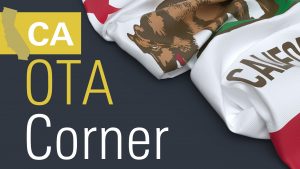 The California Office of Tax Appeals will hold an informal interested parties meeting on April 3, 2020, to discuss proposed amendments to its rules for tax appeals. The proposed amendments are in response to feedback from public and internal parties after the OTA began operating under its permanent rules for tax appeals since January 2019.
The California Office of Tax Appeals will hold an informal interested parties meeting on April 3, 2020, to discuss proposed amendments to its rules for tax appeals. The proposed amendments are in response to feedback from public and internal parties after the OTA began operating under its permanent rules for tax appeals since January 2019.
One of the proposed amendments addresses the process to request a closed hearing when a CPA firm represents its attest client. The proposed amendment states the OTA “a closed hearing shall generally be granted” when a taxpayer provides a statement from the CPA firm and the taxpayer, signed under penalty of perjury by both parties, affirming: (1) the taxpayer is a current attest client of the CPA firm; (2) the taxpayer wants to be represented by the CPA firm at the oral hearing before OTA; (3) the taxpayer would like a closed hearing; and (4) the CPA firm affirms that it cannot represent the client unless the oral hearing is closed. When a request for a closed hearing is granted, the reason for the closed hearing, along with the names of the taxpayer and the representatives, will be noted on the hearing agenda. The proposed amendments do not address whether the briefing, hearing transcript, or opinion related to a closed hearing under such circumstances will be available to the public.
COVID-19: IRS and States Extend Tax Payment Deadlines
SeeSALT attorneys Carley Roberts & Mike Le partnered with their Pillsbury tax colleagues Nora Burke & Hannah Hollingsworth to detail the impact of COVID-19 on the IRS and States Extended Tax Payment Deadlines.
Takeaways of the recent article include:
- The IRS announced that individuals and businesses may defer both federal income tax payments and filings due April 15 until July 15, without any cap on tax liability.
- California updated its tax extension to follow the IRS’s extension.
- Many other states are starting to align with the IRS’s extension or have announced other tax relief.
For the full article, please click here.



